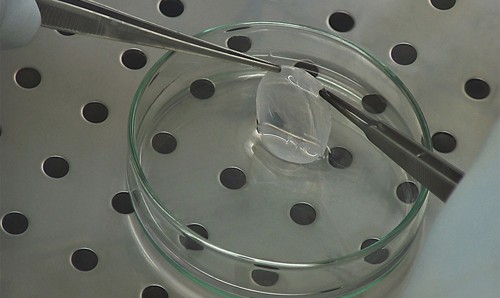
Chiesi made history two years ago when it claimed the first approval in Europe for a stem cell therapy, and can now celebrate decision by NICE to recommend its product for routine use in England and Wales.
The therapy – called Holoclar – was approved in 2015 for adults with moderate to severe limbal stem cell deficiency (LSCD) caused by physical or chemical burns to the eyes. LSCD is a rare condition that can lead to blindness, and affects just 3.3 out of 100,000 people in the EU.
Corneal cell renewal and repair are dependent upon the cells present in the limbus, which is found in a small area of the eye between the cornea and the conjunctiva. Burns to the eye can destroy the limbus, causing a deficiency of limbal cells. If this happens, the cornea is covered by a different epithelium following an invasion of cells from the conjunctiva. This process renders the cornea opaque and results in subsequent loss of vision, and conventional corneal transplant is ineffective in these cases.
Holoclar takes the form of a sheet of corneal epithelial cells, containing the patient’s own stem cells, that can be used to regenerate and repair damaged eye tissue.
The therapy has been approved with some conditions by NICE. Specifically, it can generally only be used to treat one eye, and to be eligible patients must have previously had treatment with a conjunctival limbal autograft (CLAU) – a form of transplant surgery that involves taking tissue from an unaffected eye – or be unsuitable for that procedure.
Patients with two eyes affected by LSCD can only receive the therapy in the context of research if there is not enough tissue available for a CLAU, according to NICE, which said its appraisal committee had agreed that Chiesi had presented evidence to show that Holoclar “offered several advantages over existing treatments”.
Chiesi has agreed to supply Holoclar to the NHS at an undisclosed discount to its list price of £80,000 plus VAT for a single treatment for one eye. The company said the decision will reduce the need for external donors and damage to the donor eye.
“We are delighted that NICE has recommended that eligible patients have access to this personalised and regenerative medicine for a rare and seriously debilitating orphan condition,” commented Chiesi’s UK managing director Tom Delahoyde.
Holoclar – which won the UK Prix Galien award in 2016 – is the first product from Chiesi’s nine-year-old rare disease unit to reach the market, although it could shortly be joined by Lamazym/Lamzede (velmanase alfa), used as an enzyme replacement therapy for the genetic disorder alpha-mannosidosis which is currently under review in Europe.




